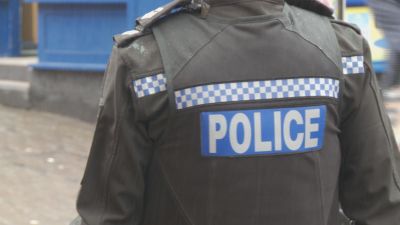Exclusive
'I thought they were taking care of me' - How gangs recruit children to transport drugs across UK

There is no getting away from it. County lines still affects every police force in the country.
Criminal gangs are moving illegal drugs from big cities to rural locations, and are using children to do it.
It is phenomenon that has been around for fewer than 10 years and continues to flourish. Children are exposed to extreme levels of violence, and trapped within drug gang networks.
I met Jordan (his name has been changed to protect his identity), who was 13 when he started running a line, lured by exploiters on the promise of new clothes.
He explained how he got involved in county lines: "I didn't have much. I didn't have a coat, a phone. I'd see people around me making money. People making £100,000 in less than six months.
"Then once I knew what to do I started going all over the country, even up to Scotland. I knew the basics, that I'd be away from my home for weeks, maybe a month, but I'd get £500 a week for it. It was just crazy money."
He was forced to live in crack dens in unfamiliar parts of the country, sleeping on floors or filthy mattresses, and was exposed to violent addicts, as well as rival groups vying over postcodes.
He described the violence he was exposed to: "The first time I went on county lines, I was stabbed. I've been shot at so many times. I've had a blade held to my neck so many times. Punched up so many times. Scars all over my body.
"I just thought it was part of life. I just accepted I was going to die whenever God took me."
It didn't occur to him that he was being groomed.
"I just saw it as they were just taking me in as their family, they were taking care of me, telling me how to act, telling me how to speak," Jordan said.
Other children - just like Jordan - are exploited in a similar way for the same sorts of crimes.
Detective Superintendent Daniel Jackson works for the Metropolitan Police on covert operations, so needs to hide his appearance.
His most recent case is likely to have involved more than 20 children. He showed me pictures of children and explained why certain young people are chosen by the Organised Crime Networks.
DS Jackson said: "This is a 13-year-old boy, he is in care. He's vulnerable. He's being used by multiple organised crime networks.
"This 16-year-old girl has been arrested many times. It's a very hard childhood she's had. The exploiters knew her from the local area and targeted her specifically."
A detective explains why one teenage girl was targeted by a drug gang
ITV News got exclusive access to the force's Modern Slavery and Child Exploitation Unit where Dan told me how the gangs go about recruiting.
He said: "The exploiters wait outside schools. They probably know their parents, they've seen them riding bikes, and they will just stop them and approach them in the street.
"If they don't do what they say, there's the threat of violence - a threat of violence towards them, towards their families. And once they're hooked, that's it, they're in. The exploiters have them in their back pocket.
"Police, CPS, the public, we all need to change the way we think about these children. Just because a child is found in possession of drugs doesn't mean they are responsible for the crime."
'The exploiters wait outside schools,' a detective said as he describes how gangs recruit children
Recognising a child victim's need for support is often difficult, but by giving them the resources they need, they can help secure convictions.
A child victim knows how the networks operate, who is involved.
The right emotional and psychological support also helps them realise that they have been exploited and can show them a different path. But prosecution and conviction rates for the main perpetrators are low.
ITV News has found that between January 2016 to March 2021, there have been only 22 prosecutions for modern slavery offences where the victim was aged 17 or under.
In that same time period, there have only been seven convictions. That's despite the National Crime Agency estimating there are around 1,000 different county drug lines operating and approximately 27,000 children in England identifying as gang members.
Dame Sara Thornton is the Independent Anti-Slavery Commissioner, appointed by the home secretary. She says it's simply not good enough.
'Those levels of prosecutions and convictions are far too low,' says Independent Anti-Slavery Commissioner Dame Sara Thornton
She said: "Those levels of prosecutions and convictions are far too low. They just give the message to the traffickers that the reward is high and the risk is low.
"People are trafficking children. They might be trafficking drugs as well, but what's more serious?"
'It's much easier to prove the trafficking of drugs than the trafficking of human beings,' says Dame Sara
She went on to explain why it is such a struggle to prosecute and ultimately convict under the Modern Slavery Act: "It's much easier to prove the trafficking of drugs than the trafficking of human beings. It's much quicker and cheaper.
"And I think sometimes the drug trafficking has been preferred to the modern slavery charges, but my argument is that's not the right thing."
Modern slavery permeates every aspect of society and ultimately, a greater understanding of the crime and greater efforts are needed from prosecutors, police and the public to protect the most vulnerable amongst us from the most extreme degradation.